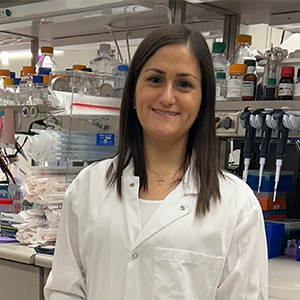-
Science Saturday: Saving time, lives and resources with new genetic testing treatment

Genomics experts worldwide released a paper highlighting advances in rare disease, cancer, population health and carrier screening at the 10th Annual Individualizing Medicine Conference on Saturday, Oct. 9.
"The use cases we explored in the paper, 'The Economic Analysis of the Value of Genetic Testing' are only the tip of the iceberg in the realm of precision medicine," says co-author Konstantinos Lazaridis, M.D., the Carlson and Nelson Endowed Executive Director for Mayo Clinic's Center for Individualized Medicine. "We found with the development of more effective sequencing methods, the prospect of truly moving genomics to the clinic for a wide variety of uses will become a reality."
Precision medicine looks at the interaction of a person's genes, environment and lifestyle, and its contribution to disease. It aims to find the right treatment for the right person at the right time for disease treatment and prevention.
Genetic testing offers many benefits, such as:
- Diagnosing and assessing the severity of disease.
- Predicting a patient's risk for developing a type of disease.
- Revealing the likelihood of passing on a disease to children.
Today, sequencing costs may be as low as $1,000 and results take only days or weeks instead of years to deliver to patients. When the human genome was mapped in 2003, it took 13 years to complete and cost $5.34 billion.
Big data sets are another critical advancement in making genomics more feasible. Advances in computational and statistical methods allow researchers and physicians to use genomic data and find targeted therapies for a patient, according to Cameron Fox, a co-author from the World Economic Forum.
Rare disease testing, diagnosis leads to more cost-effective medical care
Approximately 300 million people worldwide suffer from a rare disease, with "rare" defined as conditions that affect less than 1 in 2,000 people. Genetic factors cause 80% of these disorders. The quest for a diagnosis averages five years, and genetic testing and diagnosis remains a challenge.
Dr. Lazaridis notes the annual cost of treating rare diseases is many times higher than cancer and other notable common disorders.
"Genomic sequencing has the potential to lead the charge in a new standard of care for rare diseases," says Dr. Lazaridis. "However, rare diseases need to be coded better, and tracked in health care and other systems, so we can achieve faster, better and more cost-effective results."
Broad panel testing for lung cancer
Lung cancer is the second most diagnosed cancer and the leading cause of cancer deaths worldwide. Understanding the various genetic pathways leading to lung cancer has given rise to targeted treatments to attack cancer cells to minimize potential side effects from normal cells and tissue damage.
Testing for these mutations is an essential part of the diagnosis and treatment process. Approximately 40%–50% of lung cancers exhibit a targetable gene mutation. Appropriate, targeted treatment can increase the length of time that a patient lives with cancer and it does not worsen.
Data suggest that a broad panel test for many mutations versus narrow panel testing (fewer genes tested) can be a cost-effective way to determine the correct treatment for a patient, and this is a valuable solution to complex genetic testing.
A retrospective review noted in the paper showed that patients with lung cancer who received broad panel testing might have had higher costs, but the overall cost of cancer care was significantly lower. Other studies supported these findings. Also, the cost of adding more genes to broad panels was not significant after a certain point, lending further acceptance to their use.
Liver cancer screening in community-based population health
The population health approach aims to improve the physical and mental health outcomes, and the well-being of people within defined populations to reduce health inequalities.
The authors featured liver cancer cases in China as a model to explain the public health benefit of community-based population health testing. Liver cancer is one of the most common cancer types globally, and it is challenging to treat in its mid to late stages.
China is home to nearly 50% of new liver cancer cases and deaths worldwide. China's disproportionately high death rate is due to approximately 80% of patients diagnosed at the late stage, when treatment options are limited or expensive. Among China's high-risk population, 87 million people are hepatitis B virus carriers, an affliction that significantly elevates their risk of developing liver cancer.
Using liver cancer as a model, Genetron Holdings Ltd. works with the Wuxi Municipal People's Government (Jiangsu Province) to offer early liver cancer screening as a public health benefit to people in the city who are at high risk of developing liver cancer. By raising public awareness, detecting and diagnosing liver cancer will shift to earlier stages, significantly increasing the five-year survival rate and removing costs from the health care system.
Carrier screening for certain disorders
Couples seeking to start a family often seek out carrier screening. This test determines the risk of their offspring being born with a genetic condition, including life-limiting and medically manageable conditions.
Before pregnancy, there is considerable disagreement on what genes or diseases to include for carrier testing (genes screened based on a population or heritage versus the most common disease or syndromes). Also, there is the potential challenge of interpreting genetic variation, especially new variation, in the absence of an affected child.
While ethical dilemmas arise around carrier screening before attempting to become pregnant, offering screening in this context has advantages for a couple considering having children in the future.
Population carrier screening for at-risk communities
In response to the increased risk of certain conditions, some ethnic groups have developed carrier screening programs targeted to conditions present in their population.
Consider these examples:
- The U.S. Amish, Mennonite and Hutterite groups focus on patient education and genetic counseling to identify and treat people with inherited single-gene disorders.
- The American College of Obstetricians and Gynecologists recommends that women of Southeast Asian ancestry be screened for thalassemia. This red blood cell disorder can reduce blood oxygenation, leading to anemia.
- The Orthodox Jewish community created the Dor Yeshorim Program, which determines the "genetic compatibility" of couples interested in marriage with the hopes of preventing debilitating diseases.
The authors note targeted testing can provide an at-risk community with information to guide decision-making, maintain confidentiality, and support mental and emotional well-being.
With all of these advances in rare disease, cancer, population health and carrier screening, there is increasing need to provide timely, equitable access to genomics tools in the health care system.
"We need communities, policymakers, payers, physicians, scientists, genetic counselors, among others to help us speed up the process and move genomics into the clinic to save time, lives and resources," says Fox.
The Moving Genomics to the Clinic Project is led by the World Economic Forum’s Platform for Shaping the Future of Health and Healthcare. The paper was produced by four working groups focusing on cancer, rare disease, population health, and carrier screening in collaboration with several organizations from across the health care ecosystem.
The project aims to explore, design and test incentives to accelerate building the evidence base for clinical efficacy and utility as a way to increase coverage of genetic testing and screening. The World Economic Forum consists of the foremost political, business, cultural and other leaders of society to shape global, regional and industry agendas.
Co-authors are:
- Lynsey Chediak, head, Partnerships, Rarebase.
- Anne Claussen, vice president, Cancer and Other Serious Illnesses Transformation, CVS Health.
- Katherine Dunn, associate adviser, Intermountain Healthcare.
- Kirsten Farncombe, scientific associate, Toronto General Hospital Research Institute, University Health Network.
- Jason Flanagan, genetic counselor, Sanford Health.
- Cameron Fox, World Economic Forum
- Panos Kanavos, deputy director, LSE Health.
- Raymond Kim, clinician-scientist, Princess Margaret Cancer Centre, University Health Network, Department of Medicine, University of Toronto.
- Konstantinos Lazaradis, M.D., Mayo Clinic
- Christy Moore, program manager, Clinical Genetics, Blue Shield of California.
- Jeff Niu, innovation and experience lead, Product and Strategy, Genetron Holdings Ltd.
- Maria Raimundo, senior account manager, Beta-I.
- Shirisha Reddy, medical director, CVS Health.
- Caoimhe Vallely-Gilroy, global head, Digital Health and Therapeutics, Merck & Co. Inc.
- Bryce Waldman, strategy and business operations, Invitae Corp.
- Christina Waters, senior adviser, Congenica Ltd.
Related Articles









